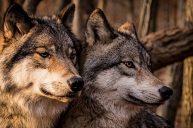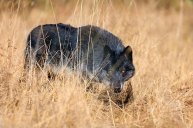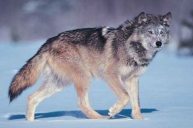When you find the perfect fishing hole, few will give it up. That seems to be true for multiple animals, including wolves. At least, that's what a new trail cam video from Voyageurs National Park shows.
In a video shared by the University of Minnesota-based Voyageurs Wolf Project, a breeding female wolf visits a fishing spot multiple times. In one clip, she sits by the water, watches and waits for the right moment, and then snatches a fish.
The catch happens so quickly that the project's video editor had to slow the moment down just so you could see it. Afterward, the wolf takes the fish a few steps away from the water, kills it, and then carries it off into the woods.
According to the project, the wolf fished at the spot again and again this past week, so she could "spend time with her pups, who are starting their young lives as pescatarians it seems!"
A Wolf Fishing is More Common Than You'd Think
Although wolves are not traditionally thought of as fishermen, it's more common than you'd think. Researchers with the project told reporters last year that they first recorded wolves fishing in 2017.
"We think that wolves hunt spawning fish across similar boreal ecosystems, and they likely have been doing it for quite a while. We don't think it is a new behavior," they said.
Additionally, they observed fishing wolves from three different packs in northern Minnesota. Of course, wolves don't fish year-round. Researchers say they typically fish from April to June when millions of fish swim upstream to lay eggs.
When they do fish, they typically find shallow waters near beaver dams because fish bottleneck in those spots. What's more, wolves in other areas of the continent, such as British Columbia and Alaska, have been observed using similar tactics to fish for salmon.
Researchers explained that wolves probably fish during that three-month timeframe because it's easier than hunting deer and other large mammals. In fact, they eat so much fish during that time that they pass up opportunities to eat moderately sized prey like beavers.
The project released the video in an effort to raise money to support the ongoing research. Although they receive support from state and federal agencies, they say "studying wolves is not cheap." They're trying to raise $130,000 to help cover the cost of salaries, supplies, and equipment.




